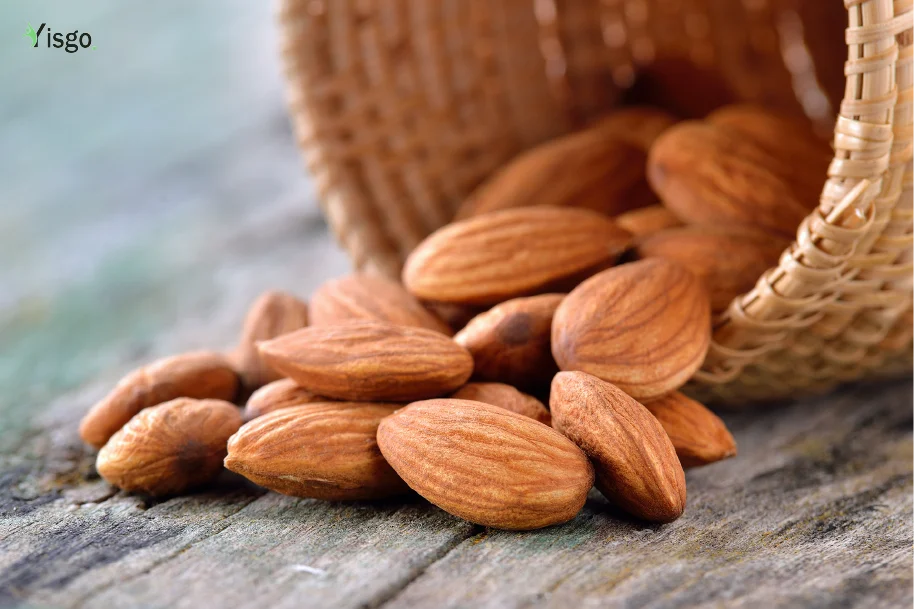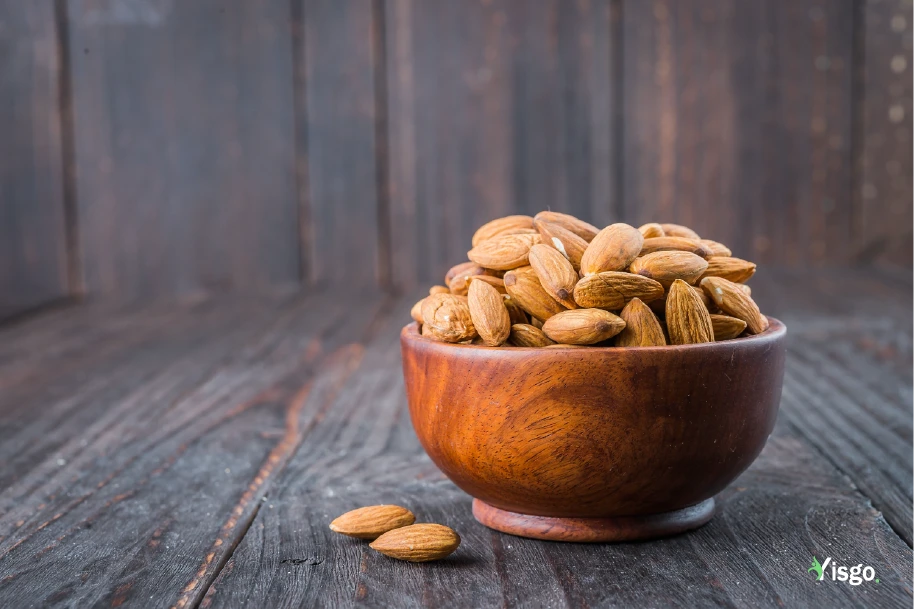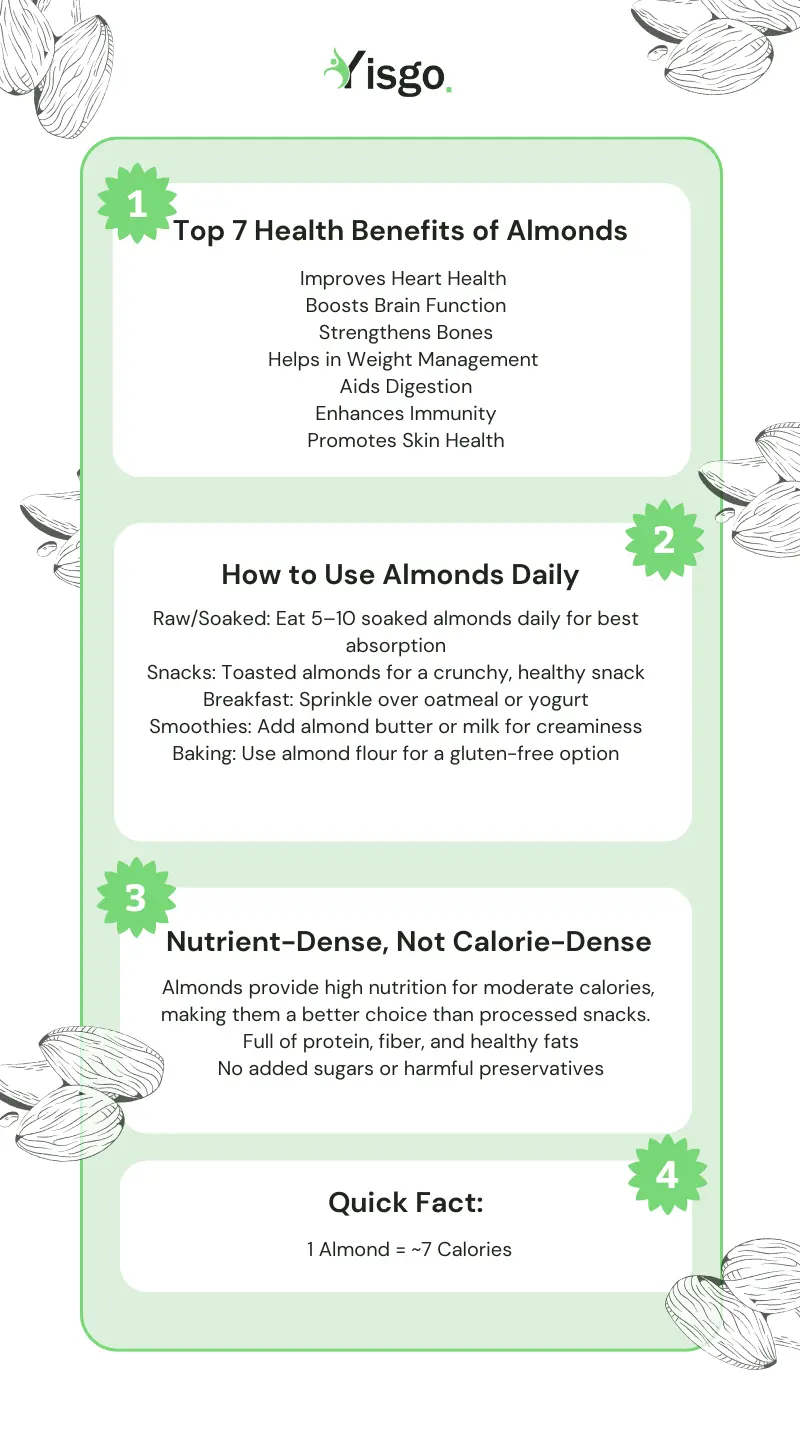The almonds are the powerhouse of all nutrients, particularly for the protein in almonds. Packed with healthy fats, essential vitamins, and fiber, they offer numerous health benefits. Whether you want to know the calories in one almond or other almond nutritional information, this blog provides multi-faceted information about badam nuts calories. Once you know how many calories in almonds, you are in a smarter position to make healthy dietary decisions.
Almonds are the nutritional hubs among the universe of nuts. These little nuts are blends of nutrition and taste. Almonds are the most healthy natural dietary supplement. Almonds are used across the globe as snacks, as essential meal ingredients, and also as a milk alternative.
Almond Nutritional Information
Now let’s share with you the details of the good news that you are searching for here. It’s the nutritional profile of almonds. Understanding the nutritional information almonds offer helps you make the right decision. Below is the useful information about the nutrients almonds have:
- Protein in almonds is a rich source of natural protein, making them an ideal choice for protein-deficient people.
- Fats: Almonds are a great source of unsaturated fats, which don’t cause obesity. They are heart-friendly and minimize bad cholesterol.
- Fiber: Almonds contain rich dietary fiber that improves gut health and digestion.
- Carbohydrates: Almonds have low levels of carbohydrates, making them ideal for low-carb food lovers.
- Vitamin E: Almond is a rich source of vitamin E, which is a strong antioxidant.
- Magnesium: The magnesium content in almonds is useful for muscle and nerve functions.
- Zinc: Almond contains zinc, which boosts immunity.
- Calcium: A great source of calcium that strengthens bones.

Explore: Best Gym Towels for Comfort and Good Performance
Almonds are a source of multiple nutrients. A 50-gram serving has almost 28 – 30 almonds, providing 200 calories, approximately:
- 20g of fats
- 10g of protein
- 5g of dietary fiber
Top Health Benefits of Almonds
Almonds are small in size but are a big source of health benefits:
- Improves Heart Health
- Support weight management
- Strengthen brain functions
- Normalize blood sugar
- Boost immunity
- Improve gut health
- Strengthen bones
- Promotes skin health
- Rich in antioxidants
Calories in One Almond
One almond has approximately 7 calories. The breakdown is as follows:
- Protein – 0.26g
- Carbohydrate – 0.24g
- Sugar 0.06g
- Fiber – 0.14g
- Calcium – 2.98g
- Iron – 0.05g
- Zinc – 0.04g
- Vit-E – 0.31g
- Fat – 0.05g
- Minerals – 6.5g
If you are vigilant about your calorie intake, want to know ‘how many almonds in one ounce’ or ‘how many calories in almonds’, the answer is “approximately 24 almonds in one ounce, providing 166 calories”.

Learn More: Healthy Fats Foods: Top Foods That Are Not Greasy
How to Use Almonds in Your Daily Diet
You will be glad to know that adding almonds to your daily diet is very easy. You can consume almonds toasted, soaked, or even raw. Below is how you can bring almonds into your daily diet:
- Snacks: A few almonds, toasted or raw, make a delicious snack. You can mix them with other dry nuts to make a flavored snack.
- Cooking: Almond flour is used in baking as a gluten-free alternative.
- Breakfast: Sprinkle chopped almonds on cereals, oatmeal, or yogurt in your breakfast. You can use almond butter on toast and in smoothies.
- Soaking: Soak almonds in water or milk overnight, then eating them raw or mixing them into some dishes makes your digestion smooth.
- Almond Milk: It is a very suitable choice for making desserts or baking.
Almond’s Nutritional Profile
Almonds are a rich source of health benefits. Before the health benefits, you need to know the nutritional information about the almonds. Below is the almond’s key nutritional information:
- Calories in Almonds: There are 164 calories in one ounce serving, approximately 23 almonds.
- Vitamins and Minerals: Almonds are packed with Vitamins and minerals.
- Healthy Fats: Almonds provide good unsaturated fats, good for weight-conscious people.

Almonds – Nutrient Density over Calories
Almonds are dense in nutrients, but not very high in calories. In other words, the calories they provide us, against that they offer a bundle of vitamins, minerals, and other very healthful ingredients. It makes them a very healthy snack option as compared to other processed high calorie meals. Many studies revealed that almonds have a very positive impact on human metabolism.
Check this out: How to Become a Certified Nutrition Specialist
Final Thoughts
The protein in almonds is a vital ingredient for muscle growth, weight management, and keeping energetic whole the day long. Furthermore, almonds are rich in nutrients with moderate calories. The variety of nutrients’ almonds have, contribute to brain function, heart health, skin improvement, and better metabolism. There are multiple ways you can take almonds in your diet to make your health shine and agile.
